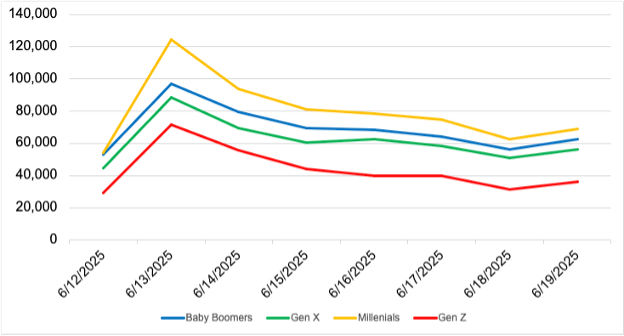Since Oct 7, many Jews have openly embraced their Jewishness through public conversations online and opinion pieces. However, findings from both the FCAS Command Center and a report from the American Jewish Committee reveal a different reality. While some Jews have openly embraced their identity, others have chosen to hide or alter their behavior out of fear, as FCAS’s analysis of social media trends from January 2022 to the present shows how discussions on Jewish identity have shifted, with Oct 7 serving as a key turning point. We compared the periods before and after this day for the selected time period in our analysis in understanding these changes.
Before Oct 7, discussions around Jewish identity were mostly centered on exploring cultural pride, with phrases such as “Jewish people,” “exploring Jewish identity,” and “Jewish life” trending in conversations about heritage and navigating antisemitism.
However, after Oct 7, the conversation changed dramatically. The use of keywords related to Jewishness doubled, with phrases such as “attacked for being Jewish” and “simply for being Jewish” trending, as discussions increasingly focused on combating antisemitism and preserving Jewish identity. A report from the American Jewish Committee found that 56% of American Jews have changed their daily behaviors out of fear, avoiding public displays of Jewish identity, such as wearing yarmulkes or Star of David jewelry.
Personal Becomes Political
This challenge extends to dating, where Jewish singles are increasingly encountering antisemitism online. Instead of engaging in typical first-date conversations, many find themselves subjected to political interrogations about their views on Israel and Zionism simply because they are Jewish.
This shift has made dating feel like a minefield, forcing many to reconsider their approach. As a result, an increasing number are choosing to date within the Jewish community, seeking partners who inherently understand their experiences and values—even if religion was not previously a determining factor in their relationships.
“Since Oct. 7, being openly Jewish feels both more urgent and more fraught. What once centered on cultural pride now carries the weight of safety, solidarity and—to some degree—survival.”
Despite rising tensions, many are embracing their Jewish identity. Stories range from a former UC Santa Barbara Student Body president empowering fellow Jews to embrace their Jewishness to BYU’s first Jewish quarterback, Jake Retzlaff.
Nicknamed the “BYJew,” Retzlaff became the face of Manischewitz’s matzo boxes, sparking national interest while expressing pride in representing Jewish traditions and sharing them with his teammates. A person’s sentiment encapsulates this pushback: “The only people who get to define Jewish identity are Jewish people.”
These developments highlight the shifting and often challenging nature of Jewish identity in America, shaped by external pressures and personal resilience.






